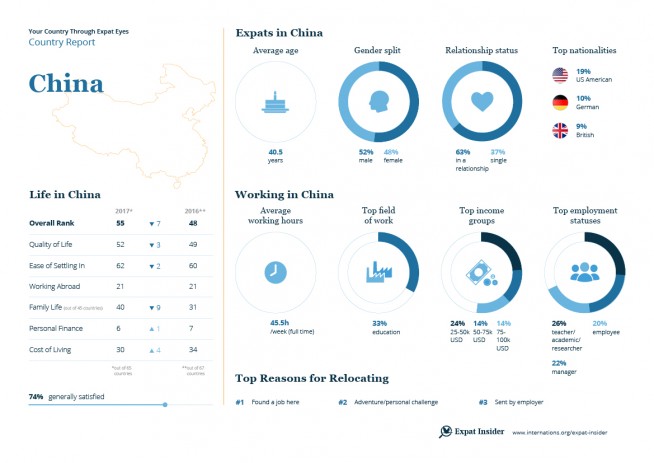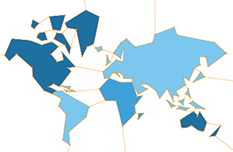China: Where Your Career Soars but Your Health Suffers
- Over two-thirds (69%) are happy with their jobs
- High satisfaction with the strong economy
- Poor performance in the Quality of Life Index
- Drop to rank 40 out of 45 in the Family Life Index
- Less than half feel at home
Content with Careers
Ranking 21st out of 65 countries in the Working Abroad Index, it’s clear that expats in China are happy with their careers. Nearly a fifth of respondents (19%) claim the main reason for their move to China was that they found a job there on their own. The ability to find employment independently may be linked to the career prospects in the country, which are rated favorably by 64% of respondents.
Over the years, China has continuously ranked well in the Personal Finance Index and comes 6th out of 65 countries in 2017. Expats seem more than content with their pay, and the country offers the second highest expat salary packages in the Asia-Pacific region, only falling behind Japan according to a survey by ECA International. These generous packages mean that expats tend to be better off than they would be in their home country, with over half of working respondents (53%) stating that they earn more in China than they would back home.
While expats in China are generally happy with their careers, the same cannot be said for working hours. With an average full-time working week of 45.5 hours, 27% of respondents are dissatisfied with their working hours. The long work days may be one of the reasons why many (27%) are disappointed with their work-life balance.
An Excellent Economy with Low Living Costs
Over half the expats in China (57%) saw the economy and/or labor market as a potential benefit prior to their move. This reflects China’s position as the second largest economy in the world and its 14.8% share of the global economy. As a result, nearly three-quarters of respondents (73%) rate the state of the Chinese economy favorably, compared to a global average of 56%.
Good pay, low cost of living, low crime.
Despite the fact that China came 74th out of 112 in a 2016 ranking of the cheapest countries to live in, expats in China seem to have more than enough to get by. More than half (51%) saw living costs as a potential benefit prior to their move, and this did not change on arrival with half of respondents rating this aspect favorably. Furthermore, 85% say that their disposable household income is enough or even more than enough to cover everything they need for their daily life (global average: 77%). “Good pay, low cost of living, low crime”, is how one Australian expat sums up the benefits of living in China.
Falling Behind in Terms of Health
One of the main reasons for China’s low performance in the Quality of Life Index — 52nd out of 65 countries — is expats’ dissatisfaction with health and medical care. Less than one in ten expats (9%) rate the quality of medical care as very good, compared to a global average of 26%. An additional 37% are generally dissatisfied with the affordability of healthcare, ten percentage points higher than the global average.
The pollution is really unhealthy and not fun to deal with. It is the reason I am leaving.
The low quality and high cost of Chinese healthcare is compounded by poor scores for the quality of the environment. A staggering 85% of respondents are disappointed with this factor, compared to a global average of just 23%. This may be connected to the fact that most expats live in large cities where pollution tends to be higher; one German expat believes that “air quality is by far the worst thing about living in Beijing”. For one Canadian expat, it proved too much: “The pollution is really unhealthy and not fun to deal with. It is the reason I am leaving.”
Frustrated Families
China has dropped nine places in the Family Life Index since the Expat Insider 2016 survey, and now ranks 40th out of 45 countries. This is largely connected to children’s health in the country, which only 4% of expat parents describe as very good (global average: 34%).
Expat parents in China are also unhappy with their children’s education options. One-fifth rate the quality of education negatively, while a staggering 72% believe that education is not easy to afford. This may be connected to the fact that close to three-fifths of expat parents (57%) send their kids to an international school, while less than one in ten (8%) send their children to a local state school.
Expat parents are also dissatisfied with their children’s free time options — only one in ten rates the available leisure activities for kids as very good, compared to a third of expat parents around the world.
Struggling to Settle In
Year after year, China continues to perform badly in the Ease of Settling In Index, and it ranks 62nd out of 65 in 2017. Less than half of the respondents (49%) feel at home in the Chinese culture and only a third believe that it is easy to settle down there. This may explain why only 5% of respondents plan on staying in the country forever (global average: 29%), and why just one respondent had acquired Chinese citizenship at the time of taking the survey.
There is a big group of expats so socializing with like-minded people is definitely a plus.
The language also poses a problem when trying to settle in, as 85% of respondents find it difficult to learn. This is understandable as Mandarin is one of the hardest languages to learn and requires, on average, 2,200 class hours to become proficient. As a result, 21% of respondents state that they do not speak the local language at all. This is particularly problematic as nearly six in ten expats (58%) believe that it is not easy to live in the country without speaking Chinese.
Limited language skills can also cause difficulties when meeting new people; two-thirds of expats in China who say their friends are mostly other expats (66%) believe that it’s difficult to make local friends because of the language barrier. This challenge means that over half of the respondents (54%) say that their friends are mostly other expats, 21 percentage points higher than the global average. However, this is not always perceived as a bad thing; one respondent from the Czech Republic believes that living in China “is a great opportunity, very interesting country and people … There is a big group of expats so socializing with like-minded people is definitely a plus.”
Further Reading
- Bloomberg: Expat Packages Are Worsening in Singapore and Hong Kong: Survey
- WE Forum: The world’s biggest economies in 2017
- Time: These Are the 50 Cheapest Countries to Live
- Effective Language Learning: Language Difficulty Ranking
- Expat Insider 2016 — China: Powerful Economy, Awful Environment
- Expats in China




